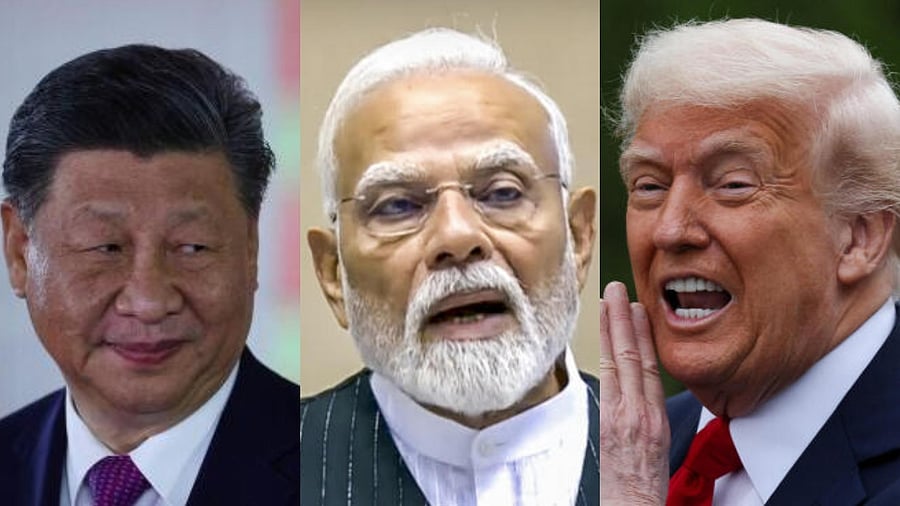
(L-R) Xi Jinping, Narendra Modi, and Donald Trump
Credit: Reuters and PTI Photos
In the opening stanza of The Second Coming, one of W B Yeats’s most famous poems, written in 1919 soon after the end of World War I surveying a world similar to ours, of chaos, confusion, and pain, the poet used a distinct imagery and vivid description of society’s collapse: “Turning and turning in its widening gyre / The falcon cannot hear the falconer; / Things fall apart; the centre cannot hold…”
The powerful metaphor drawn from the medieval sport of falconry of a falcon flying around in a widening spiral that could no longer hear the call of its owner captures in many ways the government’s predicament vis-a-vis the Donald Trump administration.
Multipolarity, multi-alignment, polycentrism — such interchangeable cliches have camouflaged the quantum leap in India’s strategic alignment with the US during the recent years under the most ‘pro-American’ government in our history. But that won't fly anymore as the old cliches are withering away following the return of Trump to the White House, in a matter of 100 days, and more so as he is inclined to deal with countries one-on-one.
Trump is juggling many balls in the air, something that comes naturally to him. Already, the contours of a settlement in Ukraine are appearing, as we await the tidings from the London conference of the US and the European allies. Again, the US-Iran negotiations have moved with ease since they began a fortnight ago to expert-level deliberations.
Of course, the crunch time will come when negotiations commence on the US-China trade issues. According to Politico, Chinese President Xi Jinping wouldn’t call Trump and the latter wouldn’t settle for a back channel, and that is what is stalling negotiations. A trace of unease may have appeared in Beijing’s statement on April 21 warning other countries against curbing trade with China to win a reprieve from US tariffs, and hinting at retaliation against countries that might do so.
The statement said, “Appeasement will not bring peace, and compromise will not earn respect. Seeking so-called exemptions by harming the interests of others for one’s own selfish and shortsighted gains is like negotiating with a tiger for its skin. In the end, it will only lead to a lose-lose situation.”
The statement warned that China “firmly opposes any party reaching a deal at the expense of China’s interests” and would “resolutely take countermeasures.”
From the Indian perspective, the Chinese warning comes as a double-edged sword. Recently, Ashley Tellis, the prominent Indian-American think tanker at Carnegie, wrote that Trump “does not think much of India in the context of US rivalry with China. His administration may have other ideas — which could surface in time.” This is a hard ball, since Washington’s geopolitical assurance in the face of India’s continued distrust of China has been the lodestar of its relationship with the US.
Evidently, the matrix is dramatically changing and as Trump keeps repeating, a deal with China is sure to emerge, sooner rather than later.
Meanwhile, on the other hand, the Indian leadership would have sensed from the visit of Vice-President J D Vance what to expect in the interim trade agreement with the US — rather, what more New Delhi could do to mollify Trump in the bilateral trade.
Tellis is a neocon wedded to the US ‘exceptionalism’ and nostalgic for the world of yesterday and the liberal international order that is drifting away. He underscored that “Trump’s policies will enhance the conditions for China’s continued rise, increase its legitimacy as a responsible power… As a result, China will join the United States as a true great power, and despite not matching up fully, both nations will stand apart from the rest of the international system in terms of sheer capabilities for several decades to come.”
Now, that is a plausible scenario, and empirical evidence is mounting by the day. Succinctly put, Tellis’ advice to New Delhi is that Trump is not good for India. Tellis is virtually inviting India to take sides with the Democrats, its natural allies, against Trump in their fratricidal strife, which not only shows what a deeply-divided house the US has become but also that Trump is a compelling reality and his tumultuous non-violent revolution will leave its mark historically.
However, the missing link here is entirely something else, going forward. It narrows down to the government’s unwillingness or inability to design the architecture for a grand bargain with China and to work towards reaching it, with at least a quarter of the whole of government fervour the ruling elites are showing for injecting verve and content to the partnership with the US — even tweaking the nuclear liability laws to generate business for the US’ nuclear vendors.
(M K Bhadrakumar is a former diplomat.)
Disclaimer: The views expressed above are the author's own. They do not necessarily reflect the views of DH.